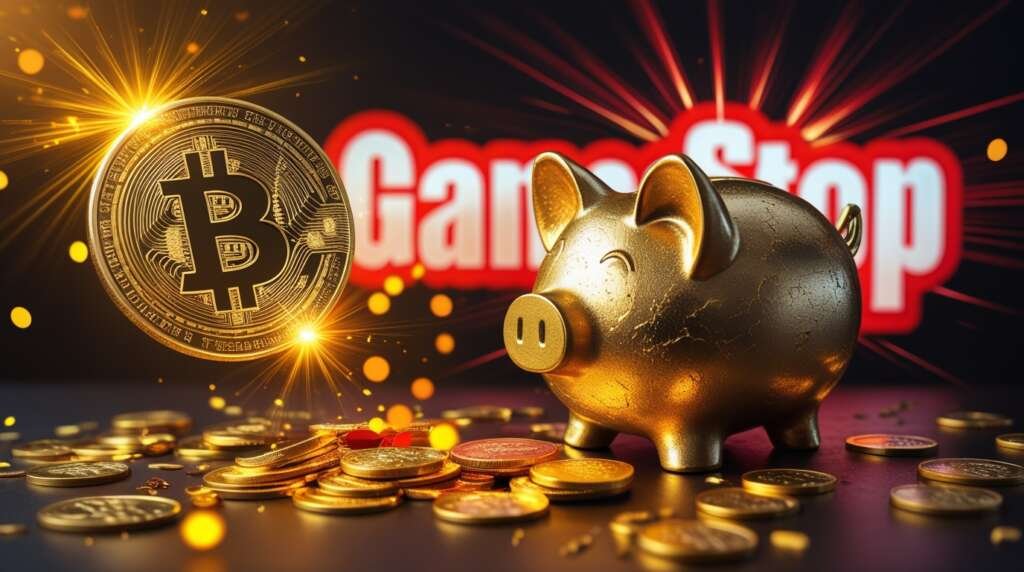GameStop (NYSE: GME) has officially announced its decision to add Bitcoin to its balance sheet, marking a major shift in its financial strategy. Once known primarily as a brick-and-mortar video game retailer, GameStop has been actively pivoting toward digital innovation in recent years. This move aligns with its broader push into blockchain technology, NFTs, and decentralized finance (DeFi). By adopting Bitcoin as a treasury reserve asset, GameStop is following a growing trend among corporations to diversify their financial holdings in the face of macroeconomic uncertainty, as firms worldwide increasingly view Bitcoin as a hedge against inflation and a long-term store of value.
An announcement regarding Bitcoin pic.twitter.com/gG8JRarIok
— GameStop (@gamestop) March 25, 2025
GameStop, a well-known name in the gaming retail industry, has struggled financially as gaming shifts to digital and consumer habits evolve. The company’s fourth-quarter revenue dropped from $1.79 billion in 2023 to $1.28 billion in 2024, though it managed to post a $131.3 million profit, primarily due to cost-cutting measures such as store closures.
To counter these challenges, the company has explored various strategic pivots, including e-commerce expansion and blockchain technology. As part of this plan, the company decided to add Bitcoin to its financial strategy. The board approved holding Bitcoin as a reserve asset, but hasn’t said how much it will buy. This move is part of GameStop’s efforts to update and strengthen its business, aligning with its broader strategy of embracing blockchain-based financial solutions.
MicroStrategy, the Company That Started It All
The decision to hold Bitcoin as part of corporate treasury reserves was pioneered by MicroStrategy (NASDAQ: MSTR), a publicly traded business intelligence firm that made headlines in August 2020 with its groundbreaking $250 million Bitcoin purchase. MicroStrategy’s CEO, Michael Saylor, described Bitcoin as a superior store of value compared to cash, citing concerns over currency debasement and inflation. Over the next few years, the company continued to accumulate Bitcoin aggressively, leveraging both corporate cash and debt financing to expand its holdings. As of 2024, MicroStrategy holds over 205,000 BTC, making it the largest corporate Bitcoin holder in the world. The company’s Bitcoin-first strategy has fundamentally reshaped its identity, transforming it from a traditional software company into a de facto Bitcoin investment vehicle.
MicroStrategy’s success with Bitcoin has encouraged other companies to explore similar strategies. The rationale behind corporate Bitcoin holdings includes:
- Hedging Against Inflation: Bitcoin is often seen as digital gold, offering protection against currency devaluation.
- Portfolio Diversification: Bitcoin provides a non-correlated asset that strengthens corporate balance sheets.
- Long-Term Growth Potential: Institutional adoption of Bitcoin continues to rise, reinforcing confidence in its future value appreciation.
Follow the Leader: Companies Across the World Embrace Bitcoin
MicroStrategy’s strategy proved that Bitcoin could be a viable asset for corporate treasuries, inspiring firms across the U.S. and worldwide to follow suit. As Bitcoin’s credibility as a treasury reserve asset strengthens, a diverse range of companies across industries and geographies have adopted similar strategies.
U.S.-Based Companies
Tesla ( NASDAQ: TSLA): Elon Musk’s electric vehicle giant purchased $1.5 billion worth of Bitcoin in early 2021. The move was widely seen as a signal that Bitcoin was gaining mainstream corporate acceptance. While Tesla eventually sold a portion of its holdings, the company’s embrace of Bitcoin played a key role in legitimizing its use as a corporate reserve asset.
Block Inc. (NYSE: XYZ): The financial services company led by Jack Dorsey allocated $50 million to Bitcoin in 2020, reinforcing its belief that Bitcoin will become the native currency of the internet. His company continues to build Bitcoin-related products, including decentralized financial services and a Bitcoin hardware wallet.
Marathon Digital Holdings (NASDAQ: MARA): One of the largest Bitcoin mining companies in North America, Marathon holds a significant portion of its BTC production as a treasury asset.
Semler Scientific (NASDAQ: SMLR): This lesser-known healthcare company allocated a significant portion of its treasury to Bitcoin in 2024, following MicroStrategy’s model.
Japanese & Asian Companies
Nexon (TYO: 3659), Japan: In April 2021, Nexon invested $100 million to acquire 1,717 BTC, citing Bitcoin’s stability as a store of value over the long term. Nexon’s CEO emphasized that Bitcoin’s limited supply made it an attractive alternative to holding excess cash reserves.
Meitu (SEHK: 1357), China: Meitu took a slightly different approach, acquiring both Bitcoin and Ethereum as part of its diversification strategy. The company framed its investment as a bet on the future of blockchain technology, highlighting the growing interest in digital assets beyond the traditional finance sector. The Chinese tech firm purchased $40 million worth of Bitcoin and Ethereum in 2021 to diversify its cash reserves.
European Companies
Mode Global Holdings (LSE: MODE), UK: The fintech company allocated 10% of its cash reserves to Bitcoin in 2020, making it one of the first publicly listed UK firms to invest in BTC.
Aker ASA (OSE: AKER), Norway: The Norwegian industrial investment giant set up a Bitcoin-focused division, Seetee, in 2021, dedicated to holding and investing in Bitcoin-related ventures.
Latin America & Beyond
MercadoLibre (NASDAQ: MELI), Argentina: Latin America’s largest e-commerce platform purchased Bitcoin for its treasury in 2021, seeing it as an emerging store of value. MercadoLibre has continued expanding its Bitcoin-related initiatives, including offering Bitcoin trading services to its customers.
Bitcoin as a Hedge Against Inflation Is a Safe Bet for Companies
The diversity of companies across sectors—from tech giants to traditional retail firms—demonstrates the increasing institutional confidence in Bitcoin. The fundamental appeal of Bitcoin as a corporate reserve asset is due to its unique characteristics. Unlike fiat currencies, which can be printed at will by central banks, Bitcoin has a fixed supply of 21 million coins. This scarcity is one of the key reasons companies have turned to Bitcoin as a hedge against inflation. In an era of aggressive monetary policy and expanding government debt, many corporations see Bitcoin as a way to preserve capital over the long term.
Additionally, Bitcoin’s decentralized nature makes it resistant to government intervention and monetary policy decisions. Unlike traditional assets such as gold or real estate, Bitcoin can be easily transferred and stored, making it a more flexible option for companies looking to diversify their treasury holdings.
Not a Smooth Ride
Despite these advantages, corporate adoption of Bitcoin is not without challenges. One of the biggest concerns is volatility. Bitcoin’s price can experience extreme fluctuations, which can impact a company’s financial statements. For publicly traded firms, holding Bitcoin can introduce accounting complexities, as current accounting rules require companies to recognize impairment losses when the price of Bitcoin drops, even if it later recovers. This has led to calls for updated accounting standards that better reflect the nature of digital assets.
Regulatory uncertainty is another major hurdle. While some jurisdictions have embraced Bitcoin, others remain skeptical or have imposed restrictions on its use. Companies that hold Bitcoin must navigate evolving regulatory landscapes, including tax implications, reporting requirements, and compliance obligations.
The decision by GameStop to hold Bitcoin in its treasury signals a broader shift in how corporations think about capital allocation. What began with MicroStrategy in 2020 has evolved into a global movement, with companies across multiple industries exploring Bitcoin as a strategic financial asset. Many companies remain cautious, waiting for greater regulatory clarity and stability before committing. However, the trend is undeniable. As institutional support for Bitcoin increases, more companies are likely to explore how digital assets can fit into their financial strategies.
While challenges remain, corporate Bitcoin adoption continues to grow, reinforcing the idea that Bitcoin is no longer just a speculative asset but a viable long-term store of value for businesses worldwide and no longer just a niche trend, regardless of the outcome, its presence in corporate balance sheets is already reshaping the financial landscape in ways few could have predicted a decade ago. As GameStop steps into this new financial landscape, will more corporations follow? The next few years may provide the answer.
Further Reading: Crypto Assets: The Good and The Bad




